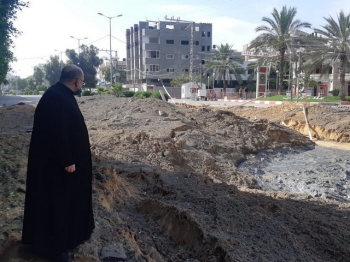A community coming together in faith: Testimony from the pastor of Gaza

During the month of May, the Gaza Strip has been the scene of appalling bombardments that have disrupted the lives of its two million inhabitants and the small Christian community that resides there. The already weak economy of this territory has been put to the test by the targeted destruction of buildings, schools and offices that is setting back Gaza infrastructure by decades. This climate of devastation also had a negative impact on the progress of projects promoted locally by the Order of the Holy Sepulchre, which over the years has generously contributed to supporting the school of the Latin Patriarchate, promoting active labor practices and policies to encourage employment and renovating the house of the Sisters of the Rosary.
The entire Gaza Strip has a very small Christian community, consisting of about 1,200 people out of more than two million inhabitants; of these more than a thousand Christians, barely 10% are Catholic. It is therefore a presence at risk of extinction, threatened by war and by the structural and contingent conditions that make the permanence of this minority in this territory unbearable, but which despite everything is kept alive by the support of the religious in loco and of the many benefactors outside of Gaza, who, through the Latin Patriarchate of Jerusalem, manage to make the life of these living stones of the Holy Land more dignified.
We contacted the pastor of the Church of the Holy Family in Gaza, Father Gabriel Romanelli, IVE, who offered us his testimony and spoke of how life there has changed in recent days.
Before the opening of hostilities, Father Gabriel tells us, in Gaza it was believed that we were coming out of the pandemic emergency, with a consequent return to a relatively normal life. The beginning of the conflict took everyone by surprise, wiping out the efforts made up to that moment, when the children were about to return to school and, in the parish, recreational activities with young people were already underway (the Church of the Holy Family has ten very active parish groups).
During the first week of the bombing, it was impossible for the faithful to reach the church because of the restrictions on mobility. However, the pastor and his associate were allowed, as an exception, to go out to visit and offer assistance to the members of the Christian community who were most in need of help - especially the elderly - bringing food and medicine, as well as visiting the Rosary Sisters who run the largest school in Gaza. This school has not been the target of bombings, as the authorities of both sides have reassured that they would never touch Christian structures, as they are places that have nothing to do with politics or with military or paramilitary groups. However, the entire compound in which the school is located has been severely stressed, as it is surrounded by sensitive places and targets, subject to heavy raids. The sisters, in any case, are well and persevere in their tireless work of prayer for an end to hostilities.
During the first week of conflict many Christian families lost their homes, destroyed or damaged by Israeli raids, and were forced to move to the homes of friends or relatives, with all the inconveniences linked to the ongoing bombings and restrictions to mobility. Since the eighth day, however, it has been possible to reopen the doors of the parish, thus allowing the reception of six families, who have miraculously given new life to the parish and who have found here an oasis of peace. A wonder, given the circumstances. What strikes us most, says the Argentinean pastor, Father Gabriel, is the enthusiasm of the children, who in this context are perhaps paying the highest price.
One little girl, a guest in the parish premises with her family, at the dawn of yet another day of bombings, confessed to the priest that she was finally able to sleep at night, thanking the Lord Jesus for his protection. "She said this with incredible tenderness, demonstrating great faith."
Like her, many other Christians are giving proof of integrity in the faith; no one seemed to waver in this dramatic moment, to the point that this small but irreducible Christian community, which also includes the Orthodox faithful who habitually attend Catholic services, are an example for the religious themselves and for the parish pastor himself. "We learn a lot from them, from their evangelical fortitude and simplicity [...], they teach us so much in matters of faith, they pray tirelessly." During all these days under the bombs, the faithful have never ceased to pray and to ask for communion. Their pastor, for his part, has never abandoned them, contacting them, reaching them and bringing them spiritual, moral and material help.
A support that, although outside this enclave, Father Gabriel feels he receives from the many Christians around the world who generously remember Gaza in their supplications and, in particular, from the Dames and Knights of the Holy Sepulchre who have never ceased to support in every way this suffering body that cries out for help.
Finally, he wished to urge people to pray for peace and justice, his inescapable logical premise, so that the hearts of men may be enlightened who, "just as they have the power to make war, they also have the power to make peace".
Filippo de Grazia
(May 2021)



